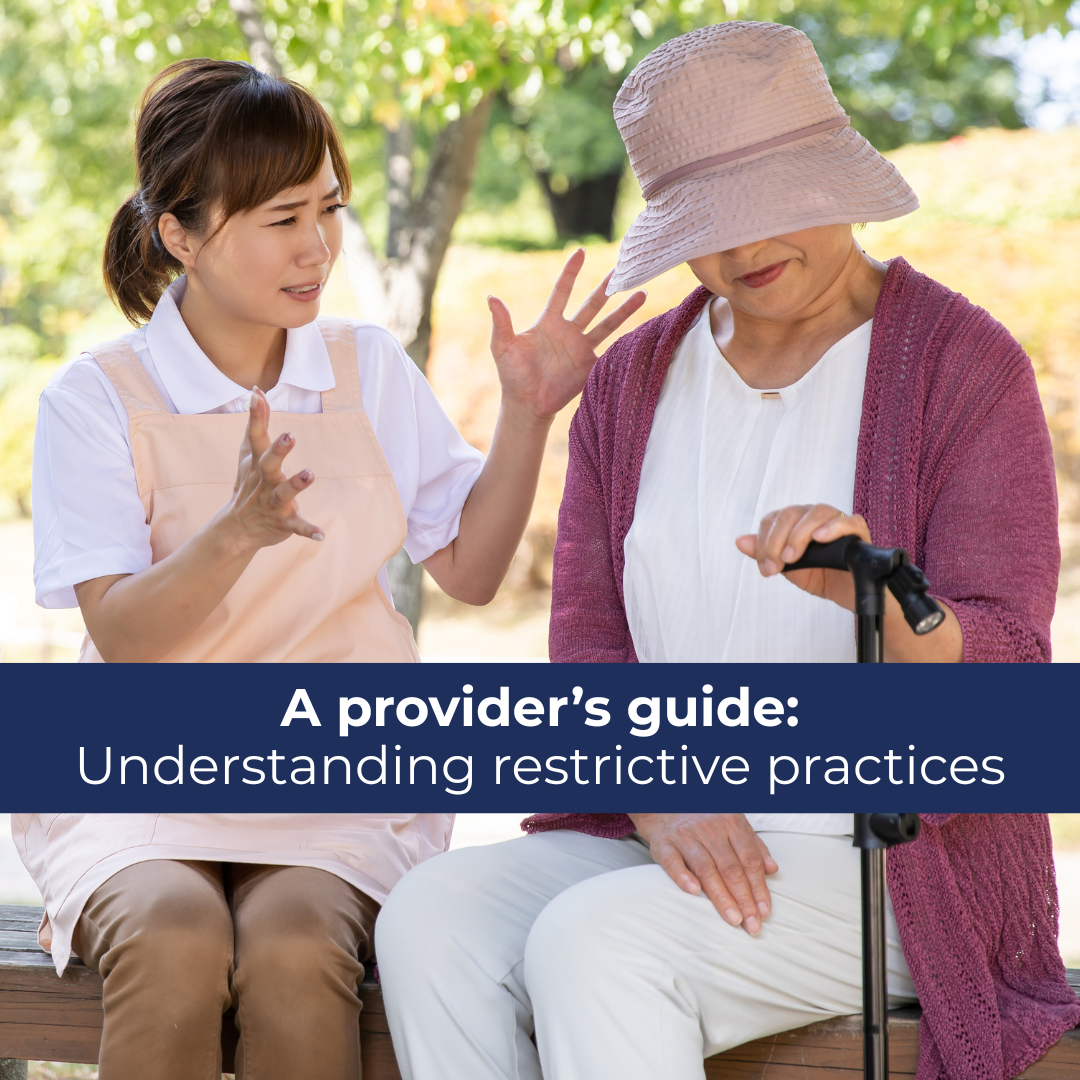In both Aged Care and NDIS (National Disability Insurance Scheme) settings, understanding restrictive practices is essential to safeguard the rights, autonomy, and dignity of those receiving care. Restrictive practices refer to interventions that limit a person’s freedom of movement, such as physical restraints, locked doors, or medication. While these practices may be necessary in certain situations, they should always be used as a last resort, after all other alternatives have been explored and found inadequate. Providers must adhere to legal guidelines, ethical standards, and receive ongoing training to ensure they are applied appropriately.

The importance of understanding restrictive practices
Restrictive practices can have significant implications on the mental and physical health of individuals receiving care. They can lead to feelings of distress, a loss of autonomy, and even physical injury. Therefore, it is crucial Aged Care and NDIS providers understand when and how these practices should be used. A clear understanding of this helps protect the wellbeing of individuals, while promoting the highest standards of care.
The Department of Health and Aged Care, for instance, stipulates these practices should only be used after all options have been explored. Care decisions must always be guided by the principles of dignity, respect, and person-centred care, ensuring it is in the best interest of the individual.
Legal and ethical guidelines
In both Aged Care and NDIS settings, adhering to legal and ethical guidelines for restrictive practices is crucial.
In Aged Care, restrictive practices must comply with the Aged Care Quality Standards and the Aged Care Act 1997. These guidelines emphasise these practices should be used sparingly and only when necessary. They must also be clearly documented, regularly reviewed, and justified based on individual needs. Providers are also required to inform and involve the client’s family in these decisions to ensure transparency and accountability.
For NDIS providers, restrictive practices can only be implemented within a behaviour support plan, developed in consultation with the participant, their carers, and relevant professionals. This plan must focus on the least restrictive options and must be authorised to ensure they are legally justified and proportionate. NDIS providers are also required to regularly review and report on the use of restrictive practices, ensuring they are only applied when it is absolutely necessary, and are always in the participant’s best interest. This approach ensures restrictive practices are used ethically, with a focus on the safety and autonomy of the individual.

The role of providers
Reducing the use of restrictive practices requires a commitment from providers to implement person-centred care approaches and to seek alternative solutions to managing challenging behaviours. This involves:
- Promoting positive behaviour support strategies: These can help prevent situations where restrictive practices might be considered necessary. Positive interventions could include environmental modifications, communication support, and targeted therapy or activities.
- Engaging families and participants: In both Aged Care and NDIS settings, involving individuals and their families in care planning is vital. This ensures decisions are made collaboratively, with full awareness of the individuals’ preferences, needs, and goals.
- Regular training: Providers must ensure their staff are regularly trained in identifying alternatives to restrictive practices, understand the legal frameworks that govern their use, and implement strategies to de-escalate potential conflicts.
Why it is essential to understand restrictive practices
Understanding the appropriate use of restrictive practices are integral to maintaining high-quality care. When used improperly, restrictive practices can lead to negative outcomes, such as psychological harm, a loss of trust in care providers, and legal repercussions. Therefore, it is essential for providers to remain vigilant, informed, and committed to minimising the use of restrictive interventions.
By applying restrictive practices in a responsible and respectful manner, Aged Care and NDIS providers ensure individuals receive care that is safe, respectful, and aligned with their rights. This is not only a regulatory requirement, but a moral responsibility of upholding the dignity and autonomy of those who rely on these vital services.

All in all, restrictive practices must always be approached with caution, respect, and a commitment to minimise their use. By understanding the legal and ethical guidelines surrounding restrictive practices, and making efforts to reduce their occurrence, providers contribute to a safer, more supportive environment for all individuals in care. This approach not only enhances the quality of care, but also promotes trust and transparency within these critical sectors.
If you, or your team, require training in this area, enrol in Skills Centre Australia’s Restrictive Practices & Behaviour Support course, which is designed to equip participants with the tools needed to apply restrictive practices responsibly and within regulations. Contact us today on (08) 8340 6875 or email us on info@kcskillscentre.com.au. For more information, or to enrol, visit our website www.kcskillscentre.com.au.


